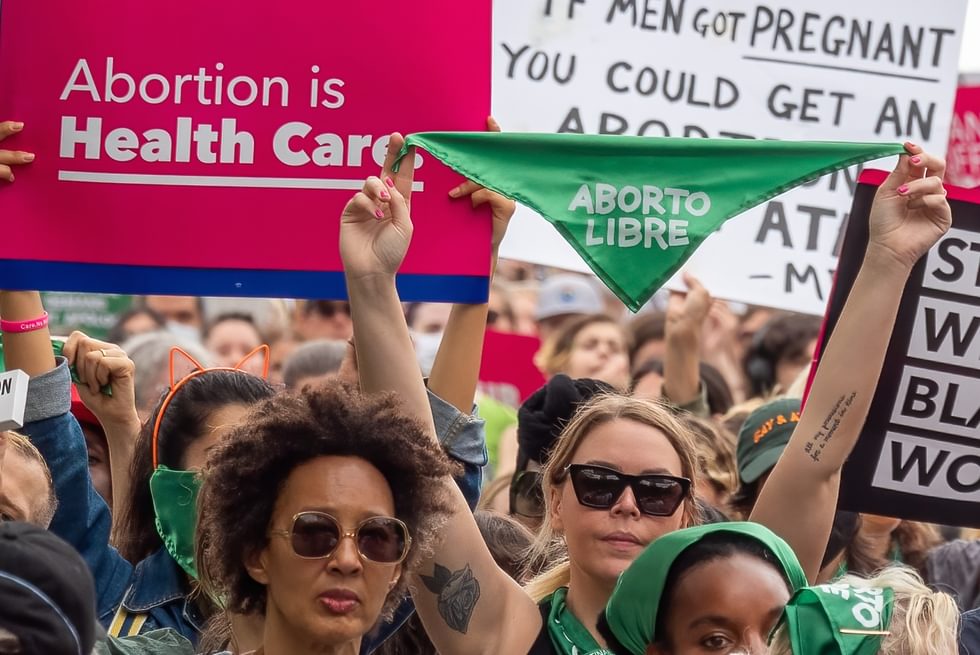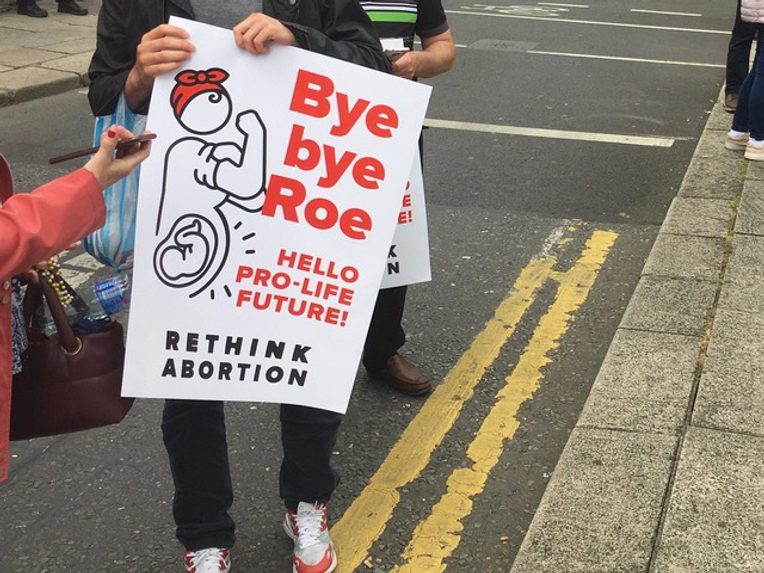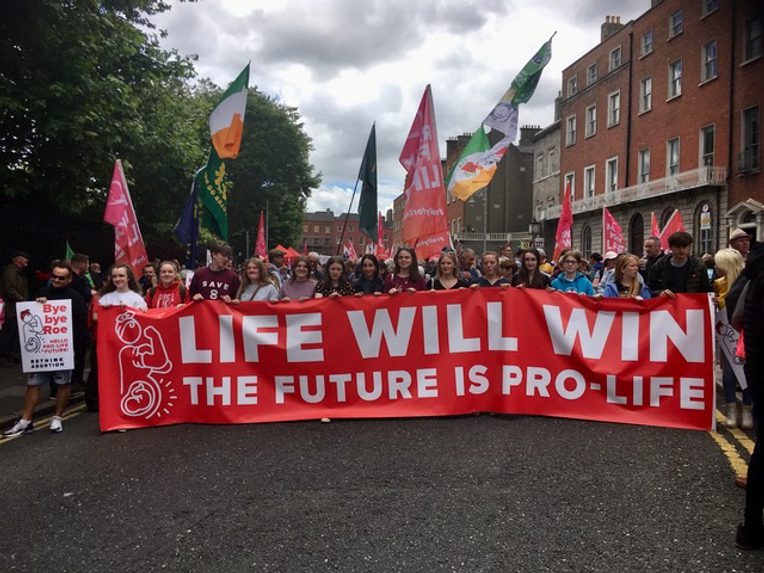Roe, Repeal, and Playing the Long Game
From the Series: After Roe
From the Series: After Roe

This year’s annual Rally for Life in Dublin occurred just one week after news broke in the United States that Roe v. Wade was overturned. Despite having no direct impact on abortion law in Ireland, the ruling featured heavily in the day’s events. A last-minute call for donations by the rally’s organizers had enabled them to print extra posters to “build on the tremendous momentum of the overturn of Roe v. Wade!” While two of the poster designs referred to Irish abortion legislation and statistics, a third featured a cartoon depicting a pregnant Rosie the Riveter alongside the text: “Bye bye Roe, hello pro-life future!” (fig. 1). As the rally marched down O’Connell Street, one of Dublin’s busiest thoroughfares, demonstrators chanted: “Roe v. Wade is overturned, come on Ireland, it’s your turn!”

From 1983 until 2018, the 8th Amendment of the Constitution of Ireland served as a de facto ban on almost all abortions, requiring that “the right to life of the unborn” be defended and vindicated through law, “with due regard to the equal right to life of the mother.” In 2018, following decades of campaigning and a fiercely fought referendum, the 8th Amendment was repealed in a move supported by 67 percent of voters, paving the way for the introduction of abortion services in 2019. Unsurprisingly given this backdrop, many passersby were not receptive to the rally’s antiabortion message, with reactions ranging from bemusement to hostility. Still others were alarmed by the sight of thousands of people marching against abortion, having hoped that the referendum’s landslide result meant the matter could be considered settled in the public sphere. “It’s like something you’d expect to see in America, not Dublin in 2022,” a woman commented to me as she eyed the rally warily. The fact that the occasional US flag or MAGA-style “Make Ireland Pro-life Again” hat could be spotted amid the rally’s crowd certainly did nothing to disabuse her impression.

Abortion rights campaigners were also cognizant of the potential effects of the Dobbs ruling in Ireland. Just a few days earlier, two separate solidarity events had been held outside the US Embassy. Standing in front of the gates, speaker after speaker decried the Supreme Court’s ruling and reflected on its global implications. As veteran activist and academic Ailbhe Smyth told the assembled protestors, “The US only has to sneeze and the rest of the world grabs its tissues.” For many, the fall of Roe serves as a stark reminder of the fact that a legal right won now is not necessarily won forever.
Irish abortion campaigners are used to playing the long game. For them, abortion rights are not static but rather objects of continuous contestation that require ongoing attention and tending. For thirty-five years they fought over the 8th Amendment, a “legal timebomb” (Lord 2015) that engendered a string of legal challenges, high-profile cases, and referenda over the decades. As such, they are keenly aware that social and legislative change can be many years in the making and that it pays not to be complacent, whether you are on the offensive or the defensive. While their own national history serves to illustrate this point, so, too, do events overseas—and none more so, at present, than those in the United States. For antiabortion campaigners, the overturning of Roe v. Wade is a success story; proof that, although they do not currently have the public support or political mandate needed to change the abortion law, this may change in the future provided they do not lose heart. For abortion rights campaigners, it is a cautionary tale; one that demonstrates the need for constant vigilance against opponents who are highly motivated, persistent, and supported by global networks promoting right-wing and religious agendas.
Of course, developments in the US have material as well as discursive effects on Irish abortion politics. Historically, the US and Irish antiabortion movements have enjoyed close links, forged both by Ireland’s history of transatlantic emigration and its perceived status as “the last bastion of an abortion-free Europe.” During the 2018 referendum, concern about US interference via the importation of activists, funds, and tactics was high. How this relationship will evolve now that both the 8th Amendment and Roe v. Wade are gone remains to be seen. That said, a newsletter I received some weeks after the Dobbs decision may provide some indication; in it, an Irish antiabortion organization invited me to “an eye-opening ‘how we did it’ presentation from the US organization that helped engineer America’s Supreme Court 180-degree turn” that promises to “teach tactics that Irish pro-lifers can use to help restore Ireland’s Culture of Life.”
Although things may look bleak for those of us who support abortion rights, there are rays of hope. Transnational solidarities are not unique to the antiabortion movement, and Irish and American abortion rights campaigners also have long-standing ties. Already, activists from Ireland (together with others across the globe) have mobilized to share their experiences and strategies, illustrating the dangers of abortion bans and outlining tactics for resisting, circumventing, and overturning restrictive laws—from direct action, to importing abortion pills, to lawfare. Of course, it should be noted that Ireland and the United States have very different regulatory and political systems. As Julie F. Kay, an American human rights lawyer, wrote in the Irish Times: “Americans will now have to fight to restore these rights, state by state and at the federal level as well, all while supporting those who need immediate access to abortion. It’s a long road but one we have no choice but to travel.” In Ireland, it took thirty-five years to achieve constitutional change. While their journey cannot provide an exact road map, hopefully some of the lessons learned mean people in the United States won’t have to wait so long.
Lord, Stephanie. 2015. “The Eighth Amendment: Planting a Legal Timebomb.” In The Abortion Papers Ireland: Volume 2, edited by Aideen Quility, Sinéad Kennedy, and Catherine Conlon, 90–103. Cork: Cork University Press.